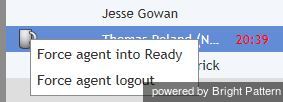From Bright Pattern Documentation
How to Change an Agent's State
As a supervisor, you can change the current state of any agent of your team. For example, if the Service Level drops below the specified threshold, you can force some agents to become Ready while they are in the After Call Work state in order to speed up the distribution of calls waiting in the service queue. You can also force an agent to log out.
To change an agent state:
- Click the Agent State icon in the Agent Metrics View.
- Select the desired agent state from the drop-down menu. Note that forced state changes may or may not be available depending on the current agent activity. For example, no forced state changes will be permitted for agents actively handling service interactions.

